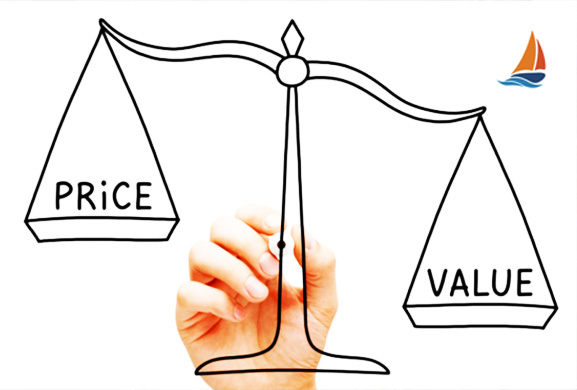
What’s My Business Worth? Understanding the Importance of a Business Valuation
Reese Wilson, Analyst – Topsail Capital Advisors
Every business owner has likely asked themselves this question at some point: “What is my business worth?” After years or even decades of hard work—developing your craft, refining processes, and building relationships—it’s natural to wonder. In a sense, you already know what your business is worth to you. It’s the foundation of your lifestyle, a source of employment for your staff, and a bedrock of relationships, both professional and personal. But if you know the value your business holds in your life, why would you need a formal valuation? And why would you trust someone else to tell you what your business is worth?
Why You Need a Business Valuation
One reason is that your view of your business’s worth is often influenced by personal factors—your time, effort, and emotional investment. However, a professional valuation goes beyond just objective financial metrics. It provides an accurate market-based assessment of your business’s value, which is critical if you plan to sell, attract investors, or prepare for succession.
The best valuations don’t focus solely on what’s visible on a tax return. They also account for intangible assets like customer relationships, brand reputation, operational efficiencies, intellectual property, and the strategic position of your business in the marketplace. These factors, while not directly reflected in financial statements, often play a significant role in driving a business’s true value.
So, Why Not Just Use a General Market Indicator?
You might turn on the TV and hear financial experts proclaiming, “valuations are up!” But, as a small or mid-sized business owner, you’re not part of a national stock index. Those statements often refer to publicly traded companies with billions in earnings. Their valuations depend on metrics like earnings per share, enormous debt-to-equity ratios, and other factors that don’t directly apply to most privately held businesses.
So, how does this affect your business? These broad market indicators can give you a sense of overall market conditions (e.g., rising interest rates may impact buyer appetite or available financing), but they don’t give you the granularity needed to assess your specific business’s value. For that, you need a tailored approach.
What Is a Business Valuation?
Business brokers and M&A firms often offer “comprehensive” or “realistic” valuations that claim to give you the best market price for your business. These valuations typically combine three things: your total assets, your business’s earnings, and an industry-specific multiplier. This formula gives a range that is theoretically your business’s market value. But while this is a solid starting point, it’s far from the whole picture.
A proper valuation will go deeper than just this formula, factoring in:
- Market conditions – How hot or cold is the market for businesses in your industry?
- Buyer sentiment – Are buyers in a position to spend, and what are they looking for?
- Financial health – Not just current earnings, but margins, cash flow, and growth potential.
- Risks and opportunities – Legal matters, customer concentration, supplier risks, etc.
How Does a Business Valuation Work for Smaller Companies?
Valuations for large, billion-dollar companies like Disney or Microsoft take years to prepare because they involve massive legal and financial due diligence. Teams of analysts sift through balance sheets, litigation risks, market positioning, and historical financial data to determine an accurate number. The goal for the acquirer is usually to find ways to devalue the target, getting a “better deal.”
For smaller businesses—those worth between $1MM and $100MM—the process is simpler but follows the same principle: presenting defensible proof of value. A strong valuation can help fend off buyers trying to negotiate down your price by questioning the reliability of your numbers.
How Are Business Valuations Devalued?
This leads to an important question: how do businesses get devalued?
While tangible assets like inventory and real estate are straightforward to value, much of a business’s worth is tied to intangibles—goodwill, customer relationships, brand value, and the earnings multiplier. Buyers often try to devalue a business by questioning:
- Reported earnings – Are they sustainable, or were they inflated by one-time events?
- Adjustments – Did the seller make legitimate adjustments (owner’s salary, one-time expenses), or are they trying to artificially inflate earnings?
- Multipliers – Is the multiplier justified by market trends and the business’s growth prospects, or could it be lower due to risk factors?
How Can You Protect Your Valuation?
The key to protecting your business’s valuation is providing hard evidence to support your numbers. This includes:
- Clean financial records – Make sure tax returns, balance sheets, and income statements are accurate and up to date.
- Documenting intangible value – If a significant part of your value comes from intangibles like customer relationships or intellectual property, be prepared to explain and defend this.
- Proving future earnings potential – Show how your business can continue to thrive under new ownership, particularly by highlighting growth areas and addressing potential risks.
How Can You Improve Your Valuation?
If the multiplier is such a critical part of the valuation equation, how can you increase it and prevent buyers from reducing it? Here are a few tips:
- Strengthen earnings – Sustainable, diversified earnings attract higher multiples. If too much of your revenue comes from a small group of customers, diversify that base.
- Optimize operations – Buyers are looking for efficiency. Improving margins, streamlining operations, and reducing unnecessary expenses can help.
- Show growth potential – Highlight areas where your business can expand, whether through new markets, new products, or improved marketing.
Why You Need a Valuation Now
Ultimately, a business valuation isn’t just about finding out how much you could sell for—it’s about preparing for the future. Whether you’re looking to exit soon, attract investors, or simply understand your position in the market, a valuation is a tool that helps you make informed decisions. Fortunately, much of what is discussed above as a means to “devalue” your business, is preventable. While it can be “too late” to defend against the inevitable scrutiny of buyers, it’s never too early to begin preparing a defense for potential devaluation.
Knowing your business’s true worth will help you protect its value, grow strategically, and ensure that when the time comes, you get what your business is truly worth.
